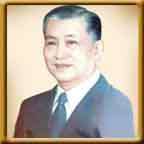Philippine legislative election, 1938
| | |||||||||||||||||||||||||||||||||||
| |||||||||||||||||||||||||||||||||||
| |||||||||||||||||||||||||||||||||||
| |||||||||||||||||||||||||||||||||||
 |
| This article is part of a series on the politics and government of the Philippines |
|
Legislature
|
|
Constitutional Commissions |
The Elections for the Second National Assembly were held on November 8, 1938, under a new law that allowed block voting[1] which favored the governing Nacionalista Party (which the Democratica and the Pro-Independencia factions reconciled). As expected all the 98 seats of the National Assembly went to the Nacionalistas. José Yulo who was Quezon's Secretary of Justice from 1934 to 1938, was elected Speaker.
Summary
Ahead of the first midterm polls in the country, the two factions of the Nacionalista Party had already reunited. The party went into the 1938 Elections with the confidence of having practically every branch of government under the control of its stalwarts. This reconsolidation of political forces left the opposition in tatters, with the Allied Minorities, a loose caucus of opposition parties, failing to stop the Nacionalista bid.
The elections of 1938 proved to be historic in two ways: It was the first and last time that a single party would secure 100 percent of the seats in the legislature, with the Nacionalistas winning all 98 seats; and it ushered in the years of one-party rule in the country.[2]
Results
| Party | Seats won | |||
|---|---|---|---|---|
| Total | % | +/− | ||
| Nacionalista | 98 | 100% | ||
| Total | 98 | 100% | ||
| Sources: Cesar Pobre. Philippine Legislatures: 100 Years. & Dieter Nohlen, Florian Grotz, Christof Hartmann, Graham Hassall & Soliman M. Santos. Elections in Asia and the Pacific: A Data Handbook: Volume II: South East Asia, East Asia, and the South Pacific. | ||||
Contributions
The Second National Assembly embarked on passing legislations strengthening the economy, the cloud of the Second World War loomed over the horizon. Certain laws passed by the First National Assembly were modified or repealed to meet existing realities.[3] A controversial immigration law that set an annual limit of 50 immigrants per country which[4] affected mostly Chinese and Japanese nationals escaping the Sino-Japanese War was passed in 1940. Since the law bordered on foreign relations it required the approval of the U.S. President which was nevertheless obtained. When the result of the 1939 census was published, the National Assembly updated the apportionment of legislative districts, which became the basis for the 1941 elections.
Note
- A. ^ The combined number of seats of the Nacionalista Party after the two factions merged back together.
References
- ↑ Block voting - Philippine Daily Inquirer. Accessed on April 13, 2007.
- ↑ Presidential Communications Development and Strategic Planning (2013). Philippine Electoral Almanac. p. 11.
- ↑ Commonweatlh Act (CA) No. 494 amended CA 444 "Eight Hour Law" authorizing the President to suspend the law.
- ↑ Immigration Act of 1940 (CA No. 613), Sec. 13. Accessed on April 13, 2007
